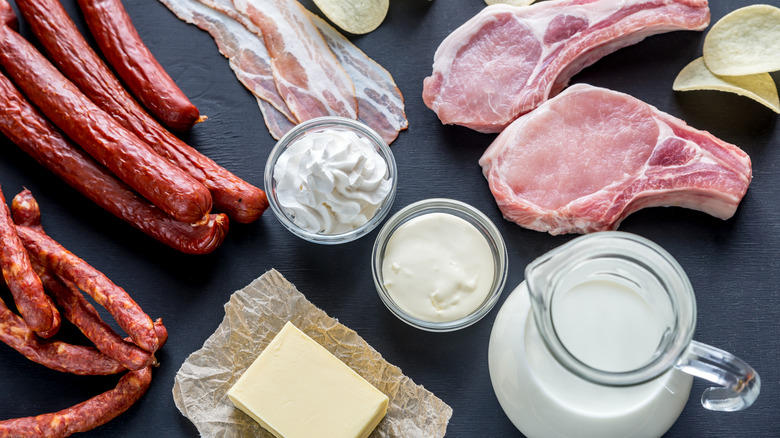Trans Fat Vs. Saturated Fat: Which Is Healthier For You?
If you've ever tried to lose weight, chances are you've counted calories, macros, serving sizes, or some combination of the above. You likely know about the Nutrition Facts label that each food in the United States has printed on the container. On it, if you look at the fat, you'll find total fat, saturated fat, and trans fat. You might have heard about the different fats, and you might even know that some fats are healthy, while you should avoid others.
It could be hard to know which fats are healthy and which aren't, though, and that's why knowing the differences between saturated fat and trans fat is essential, especially for heart health (via Healthline). If you're confused, there's good news! You can include some healthier fats and even less healthy fats in your diet in moderation without suffering significant health complications if you know the difference. Read on to find out more about the differences between trans and saturated fat.
Here's how often you should eat trans or saturated fat
According to Healthline, fat is essential to your body, just like proteins and carbohydrates. Unfortunately, when it comes to saturated and trans fats, both types are unhealthy, especially in large amounts. They can harm your health, and typically, they're solid at room temperature. Medline Plus revealed that trans fat is the worst for your health. Many processed foods contain trans fat, and it's also in margarine and shortening. This fat not only raises your LDL (bad) cholesterol but also lowers your HDL (good) cholesterol, which could leave you at a higher risk of heart disease. Because your body does not need any trans fat, you should eat as little as possible.
As for saturated fat, it's primarily animal fat, and you probably consume it in dairy products and high-fat meat (via Healthline). Tropical oils and lard also contain saturated fat. Harvard University reported that saturated fats aren't as bad as health officials once worried, but you should still consume them sparingly because they can raise your LDL cholesterol.
Ultimately, you should eat more polyunsaturated and monounsaturated fats like nuts, avocado, olive oil, salmon, and seeds. If you're concerned about trans fat or saturated fat, be sure to discuss it with your doctor.

